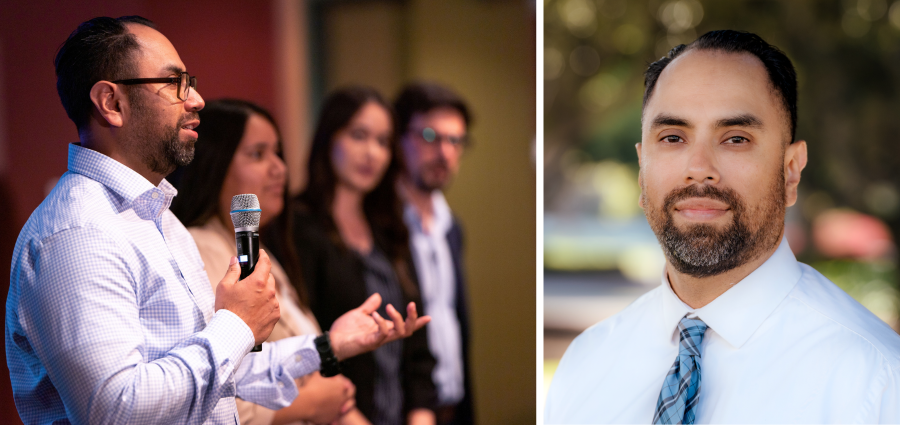Guillermo says he was lucky to find his current role only an hour after it was posted (by a Bren alum!), but he also attributes his success to "being prepared to act quickly when the opportunity came up" and says the process made him realize the power of making intentional connections with Bren alumni.
Quick Facts About Guillermo
Job Title and Organization: Data Scientist at Spatial Informatics Group – Natural Assets Laboratory (SIG-NAL)
Sector: Non-profit
Field: Data science
Years at the Organization: 1.5 years
Years in the Field: 2 years
Connect with Guillermo: LinkedIn Profile
Describe your job in 5 sentences or fewer.
I lead geospatial analysis and data tool development focused on wildfire mitigation, land use planning, and climate resilience. I design and maintain GIS applications using a combination of ESRI tools and Google Earth Engine. I have developed tools such as interactive maps, dashboards, and landscape suitability models that help visualize and prioritize environmental projects. Additionally, I streamline workflows for spatial and AI modeling, adapting complex systems to reduce outsourcing costs.
How did you find out about and land your current position?
I found my current position through a LinkedIn job posting. I was fortunate; I didn’t actively seek it out, but the role happened to be posted by the Director, who was also a Bren alum. I came across the listing around 7 a.m., just an hour after it went live. I quickly updated my resume and cover letter and submitted my application within the next hour, becoming one of the first applicants. It was partly luck in seeing the posting early, but also a result of being prepared to act quickly when the opportunity came up.
How has your Bren School experience or training helped you in your career/job?
I apply many aspects of what I learned and experienced through MEDS on a daily basis whether I’m coding a solution, interpreting climate model outputs, or communicating results to colleagues or the public. What’s helped me most is the ability to develop custom solutions and workflows to meet unique project needs. The program prepared me to think critically and adapt, which is essential in my role.
What job search tips/tactics can you recommend to help someone find a job in a highly competitive job market (what has worked well for you or other people you know)?
As I mentioned, I was lucky to find the posting so early, but part of that was because I was constantly refreshing and experimenting with different job board searches. I’d heard the advice to treat the job search like a full-time job, but for me, it became more of an obsession. I was fortunate to have the time and space to focus entirely on it. In addition to actively applying, I kept my personal website, LinkedIn, and GitHub up to date, and made sure my projects were ready to showcase. That preparation paid off in interviews, where I could show my work, not just talk about it.
Do you have any advice or encouragement you’d give other alumni or current students about networking?
I was fortunate that my job search led me to be in front of a Bren alum, but it made me realize how valuable it could have been to intentionally network with alumni earlier in the process. Being able to connect with people who understand your background and training can make a big difference not just in finding opportunities, but in feeling supported. If I could go back, I’d make more of an effort to reach out and build those connections from the start. It doesn’t have to be formal—even a short conversation can open unexpected doors.
What was the best advice you received while at Bren?
The best advice I received at Bren was to find balance. It’s easy to spiral into a negative place when you place too much pressure on yourself.
What environmental challenge do you think you have the most chance of positively impacting in your field, why, and how? Please feel free to include any trends/directions you see your field/sector going.
It’s still early in my career, so I’m not entirely sure which specific environmental challenge I’ll impact most, but I believe the combination of the work I do now and the effort I put into continually developing my skills will lead me to the right opportunity. I work at the intersection of geography, AI, and environmental issues, and I see growing potential in using spatial and machine learning tools to support climate resilience, wildfire mitigation, and sustainable land use. As environmental problems become more complex, interdisciplinary approaches will only become more critical, and that’s where I hope to make a difference.
What is your favorite book or magazine that has impacted your career?
Spatial Lab by Matt Forrest, along with his other content, has been a great resource for me. I follow his work closely because it keeps me engaged in learning and helps me stay current with tools and trends in geospatial technology. His practical insights and focus on real-world applications have definitely influenced how I approach my own work.
What is your favorite travel destination?
El Salvador.
What is your favorite quote?
"The end of all education should surely be service to others." – Cesar Chavez
